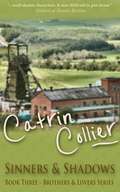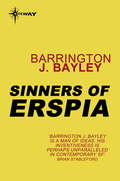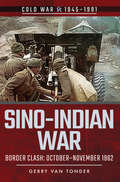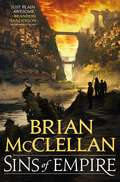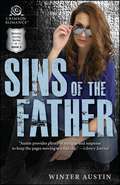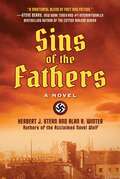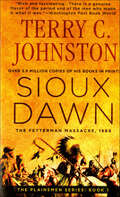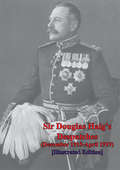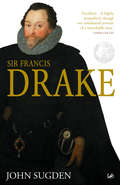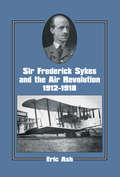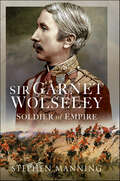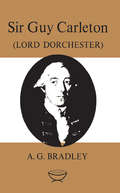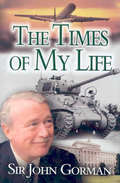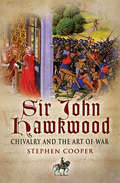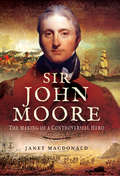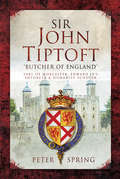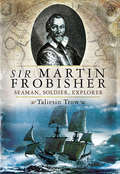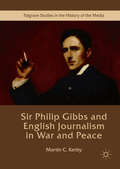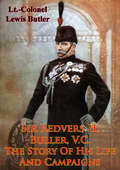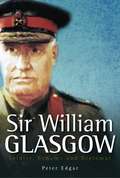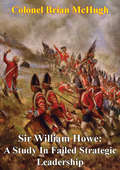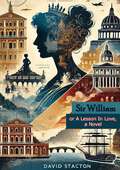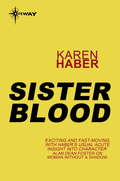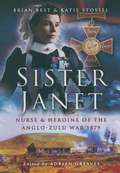- Table View
- List View
Sinners and Shadows
by Catrin CollierVictoria Lachlan is orphaned at birth and raised by Jane McCrady whom she believes is her great-grandmother. When Jane dies Victoria is offered a home with the Pringles and a job in Darlonachie Castle kitchens. But times are changing both above and below stairs following the first world war. As Victoria grows into a beautiful young woman she has to face difficult choices and come to terms with a long buried secret from the past.
Sinners of Erspia
by Barrington J. BayleyThe Sinners of Erspia are the inhabitants of a bizarre world, ruled and guided by the hands of Ormazd and Ahriman, twin gods of good and evil. Histrina, a child of Ormazd, is taken by the evil hordes to a camp of terror where she meets Laedo, a man stranded far from his home.Together they start on a hallucinatory journey to understand and escape from the surreal world that holds them prisoner.
Sino-Indian War: Border Clash: October–November 1962 (Cold War 1945-1991 Ser.)
by Gerry van TonderFor a hundred years, British and Chinese territorial claims in the Himalayas conflicted, with Indian historians claiming that the region was the fountainhead of Hindu civilization. In the halcyon days of the Raj, London saw Afghanistan and Tibet as buffers against Russian and Chinese imperialism. In 1913, an ephemeral agreement between Britain, Tibet and China was signed, recognizing the McMahon Line as the border of the disputed territory. China, however, failed to ratify the agreement, while India protested against a loss of historical land.After the Second World War, India became independent of Britain and Chinese Communists proclaimed a peoples republic. Despite cordial overtures from Indian Prime Minister Nehru, in late 1950 the Chinese Peoples Liberation Army (PLA) invaded Tibet. In the ensuing twelve years, Indian diplomacy and Chinese cartographic aggression were punctuated by border incidents, particularly in 1953 when armed clashes precipitated a significant increase in the disposition of troops by both sides. In the spring of 1962, Indian forces flooded into the Ladakh region of the state of Jammu and Kashmir, to check the Chinese.In a spiralling game of brinkmanship, in September, ground forces were strategically deployed and redeployed. On 10 October, thirty-three Chinese died in a firefight near Dhola.Embittered by Moscows support of India against a sister communist state, and in a bid to clip Nehrus belligerent wings, on 20 October, the PLA launched a two-pronged attack against Indian positions.
Sins of Empire (Gods of Blood and Powder #1)
by Brian McclellanA new epic fantasy series from highly acclaimed fantasy author, Brian McClellan, set in the same world as The Powder Mage trilogy. A world on the cusp of a new age... The young nation of Fatrasta is a turbulent place -- a frontier destination for criminals, fortune-hunters, brave settlers, and sorcerers seeking relics of the past. Only the iron will of the lady chancellor and her secret police holds the capital city of Landfall together against the unrest of an oppressed population and the machinations of powerful empires. Sedition is a dangerous word... The insurrection that threatens Landfall must be purged with guile and force, a task which falls on the shoulders of a spy named Michel Bravis, convicted war hero Mad Ben Styke, and Lady Vlora Flint, a mercenary general with a past as turbulent as Landfall's present.The past haunts us all... As loyalties are tested, revealed, and destroyed, a grim specter as old as time has been unearthed in this wild land, and the people of Landfall will soon discover that rebellion is the least of their worries.For more from Brian McClellan, check out:The Powder Mage TrilogyPromise of BloodThe Crimson CampaignThe Autumn Republic
Sins of the Father
by Winter AustinNewly pinned deputy Jolie Murdoch's first big job as a McIntire County deputy is to locate a missing girl. What Jolie doesn't expect is to stumble upon a corpse--the girl's father--with a prime suspect still hanging around. But why would local bartender Xavier Hartmann go off the deep end and bludgeon a man to death?A former marine, Xavier is barely coping with a traumatic brain injury, and he has no memory of what happened at the crime scene. He came to Eider to confront his past, not get embroiled in a murder as the number one suspect. To make matters worse, as the mystery deepens, Xavier finds himself drawn to the reluctant deputy.As Jolie fights against mounting pressure to get to the truth, she realizes there's more to Xavier than meets the eye. But someone is lingering on the fringes, determined to put a stop to her investigation and Xavier's freedom. Will Jolie do her sworn duty or buck the status quo to give her and Xavier's newfound passion a chance?Sensuality Level: Behind Closed Doors
Sins of the Father
by Winter AustinNewly pinned deputy Jolie Murdoch's first big job as a McIntire County deputy is to locate a missing girl. What Jolie doesn't expect is to stumble upon a corpse--the girl's father--with a prime suspect still hanging around. But why would local bartender Xavier Hartmann go off the deep end and bludgeon a man to death?A former marine, Xavier is barely coping with a traumatic brain injury, and he has no memory of what happened at the crime scene. He came to Eider to confront his past, not get embroiled in a murder as the number one suspect. To make matters worse, as the mystery deepens, Xavier finds himself drawn to the reluctant deputy.As Jolie fights against mounting pressure to get to the truth, she realizes there's more to Xavier than meets the eye. But someone is lingering on the fringes, determined to put a stop to her investigation and Xavier's freedom. Will Jolie do her sworn duty or buck the status quo to give her and Xavier's newfound passion a chance?Sensuality Level: Behind Closed Doors
Sins of the Fathers: A Novel
by Herbert J. Stern Alan A. WinterIn the tradition of Herman Wouk, author of Winds of War and War and Remembrance, the novel Sins of the Fathers is the thoroughly researched historical sequel to Wolf. History hinged on a call as the German high command waited for Hitler&’s order to invade Czechoslovakia. That was the signal that would launch their revolt to bring down the Reich. Every detail of the coup was in place. Access roads to Berlin would be blocked. The city sealed. Communication centers taken. A commando squad―sixty hand-picked men―were ready to storm the Chancellery and seize Hitler. The only open question: to try Hitler as a traitor or execute him on the spot.Sins of the Fathers is the eye-opening novel―based on historical facts―of the efforts of German military leaders, career civil servants, and clergy to solicit England&’s assistance to bring down the tyrant in 1938. When Prime Minster Neville Chamberlain refused to meet with them, they turned to Winston Churchill, who secretly supported their cause. Armed with a strongly worded letter from the future prime minister, they waited for Hitler&’s telephone call ordering German troops to invade Czechoslovakia―the signal for their uprising. But the call did not come. Instead, Prime Minister Chamberlain went to Hitler&’s apartment in Munich only to bow to the dictator&’s will. The invasion was over before it began―and with that, so was the coup. Flying home, Chamberlain announced he had obtained &“peace for our times.&”Sins of the Fathers―the sequel to Wolf about Hitler&’s rise to power―tells the dramatic true story of the foolish prime minister that undermined the coup to topple the regime, delivered Czechoslovakia to Hitler, saved the Führer&’s life, and paved the road to World War II.
Sioux Dawn: The Fetterman Massacre, 1866 (The Plainsmen Series)
by Terry C. JohnstonAn Irish immigrant gets caught up in an explosive battle during Red Cloud’s War in this action-packed Western adventure.“The author’s attention to detail and authenticity, coupled with his ability to spin a darned good yarn, makes it easy to see why Johnston is today’s best-selling frontier novelist. He’s one of a handful that truly knows the territory.” —Chicago TribuneNo one captures the glory, adventure, and drama of the courageous men and women who tamed the America West like award-winning author Terry Johnston. His Plainsmen series brims with colorful characters, fierce battles, and compelling historical lore.The Civil War was over—and for cavalry sergeant turned soldier-of-fortune Seamus Donegan, the great westward march has begun. Along with other settlers and soldiers pouring out of the East along the Bozeman Trail, Seamus will make a dangerous journey into the heart of Indian territory . . . and cut deep into sacred grounds. For Red Cloud and his Sioux warriors, this means war. So begins an epic battle between two great civilizations: the Fetterman Massacre of 1866.
Sir Douglas Haig's Despatches (December 1915-April 1919) [Illustrated]
by Field-Marshal Earl Douglas HaigField-Marshal Haig commanded the British Empire forces through from 1915 to 1919; his period in charge of the men under his command has been the subject of much debate ever since the First World War ended. To some he was a "Butcher" overseeing the bloodbaths of the Somme and Passchendaele, to others he was a stoic leader faced with almost insurmountable difficulties of the warfare of the age. Whichever opinion holds sway in the public psyche, his despatches from the front, are gripping reading that drive to the heart of his character. Often fulsome of praise for the men under his command, Haig was reticent to give vent to failures in public; the despatches are very revelaing, whilst capturing all of the swings of fortune on the Western Front.Author -- Field-Marshal Earl Haig, Douglas, 1861-1928.Text taken, whole and complete, from the edition published in London, J.M. Dent & sons ltd.; 1919.Original Page Count - xvii and 378 pagesIllustrations -- 10 maps and Illustrations.
Sir Francis Drake
by Dr John SugdenHow well do you know the life of one of Britain’s great maritime heroes? Discover the truth behind a man who remains a legendary figure of history more than four hundred years after his death.Sir Francis Drake’s career is one of the most colourful on record. The most daring of the corsairs who raided the West Indies and Spanish Main, he led the English into the Pacific, and cirumnavigated the world to bring home the Golden Hind laden with Spanish treasure. His attacks on Spanish cities and ships transformed his private war into a struggle for surivival between Protestant England and Catholic Spain, in which he became Elizabeth I's most prominent admiral and marked the emergence of England as major maritime nation.‘Excellent...It deserves to become the standard Drake life. His scholarship is impeccable’ Frank McLynn, Sunday Telegraph
Sir Frederick Sykes and the Air Revolution 1912-1918 (Studies in Air Power)
by Lieutenant-Colonel Eric AshThis is a long-overdue study of Sir Frederick H. Sykes, Chief of the Air Staff of Britain's Royal Air Force (RAF) during the First World War. Historians, for the most part, have either overlooked Sykes or misinterpreted him, leaving a gap in the story of British flying. Contrary to previous images of Sykes, we now see that he was not a secretive intriguer or a tangential subject in RAF history. Rather, he played a fundamental part in organizing and leading British aviation from 1912 to the end of 1918. He provided organization, visionary guidance and efficient administrative control for the fledgling service that tried to survive infancy in the heat of battle.
Sir Garnet Wolseley: Soldier of Empire
by Stephen ManningField Marshal Lord Wolseley was an eminent Victorian, one of a handful of late nineteenth-century military men whose reputation transcends his age. He served the British empire in Burma, India, China, the Crimea, Canada, Asante, Egypt, South Africa and the Sudan. He excelled as a regimental soldier, staff officer, army commander and reformer and eventually commander-in-chief. Yet there has been no substantial work on Wolseley for a generation and a reassessment based upon a fresh look at the man and his achievements is long overdue. That is why Stephen Manning’s perceptive military biography, which sets Wolseley firmly in the context of his period and seeks to strip away the legend that developed during his lifetime, is so timely and important. Each of Wolseley’s campaigns is examined in vivid detail and there are graphic descriptions of the major battles in which he took part, either as an officer or a general. His performance as a commander, from his great success during the expedition against the Asante to his failure to rescue Gordon from Khartoum, is critically assessed to see if he deserves his brilliant reputation. His efforts as an army reformer are examined too, in particular whether he could have done more to prepare Britain for war against the Boers. Stephen Manning’s incisive account of Wolseley’s career will be fascinating reading for anyone who is interested in the British army in the nineteenth century, in colonial warfare and in the exploits of one of Queen Victoria’s most admired generals.
Sir Guy Carleton: Lord Dorchester
by A. G. BradleyThis biography of Sir Guy Carleton was first published in the famous Makers of Canada series in 1907, and re-issued in 1926 with supplementary notes incorporating later research by A.L. Burt. When it first appeared it was reviewed by William Wood, who described it as "a really good book on one of the greatest makers of the Empire."
Sir John Gorman: The Times of My Life
by John GormanThe Northern Ireland politician and British Army veteran chronicles his storied life in this memoir.After serving in the Irish Guards in northwest Europe (where he won a legendary MC for ramming a King Tiger tank), John Gorman’s career included being Head of Security with BOAC, and closely involved with Royal visits. Later he was Europe’s largest landlord running the Northern Ireland Housing Executive. before entering politics and becoming Deputy Speaker of the Northern Ireland Assembly. Sir John Gorman exudes relaxed charm, humour and impeccable style. This book mirrors all these enviable characteristics and makes for a thoroughly enjoyable and entertaining read.
Sir John Hawkwood: Chivalry and the Art of War
by Stephen CooperIn Florence cathedral hangs a remarkable portrait by Uccello of Sir John Hawkwood, the English soldier of fortune who commanded the Florentine army at the age of 70 and earned a formidable reputation as one of the foremost mercenaries of the late middle ages. His life is an amazing story. He rose from modest beginnings in an Essex village, fought through the French campaigns of Edward III, went to Italy when he was 40 and played a leading role in ceaseless strife of the city-states that dominated that country. His success over so many years in such a brutal and uncertain age was founded on his exceptional skill as a soldier and commander, and it is this side of his career that Stephen Cooper explores in this perceptive and highly readable study.
Sir John Moore: The Making of a Controversial Hero
by Janet MacdonaldSir John Moore is perhaps the second most famous British soldier of the Napoleonic Wars after the Duke of Wellington, yet his remarkable career has been neglected in comparison to his celebrated contemporary. His death in battle at Corunna overshadows the wide range of his earlier campaigns and his achievements as an innovative soldier. Janet Macdonalds fluently written and insightful biography focuses on the development of his character as well as his career as a commander. From it emerges a many-sided portrait of a fascinating man and an outstanding soldier, a key figure in the history of the British army. Admired by his peers but distrusted by his political masters, Moore was a controversial figure. He is best known for saving the British army in Spain by leading the retreat to Corunna, but he is also credited with developing the training system that enabled Wellingtons army to beat the French in Spain and at Waterloo. Janet Macdonalds account will rekindle interest in a leading actor in the struggle against the French revolutionary and Napoleonic armies.
Sir John Tiptoft: Earl of Worcester, Edward IV's Enforcer and Humanist Scholar
by Peter SpringJohn Tiptoft, Earl of Worcester, is arguably the most intriguing, controversial and possibly misunderstood figure of the Wars of the Roses period. Politically adept, he occupied a string of important offices, first under the Lancastrian Henry VI and then the Yorkist Edward IV.A man of action, he held commands on both and sea, in England, Ireland and Wales.As Constable of England he acted as Edwards enforcer and earned the sobriquet Butcher of England for his beheadings and impalements. Yet he was also an outstanding Renaissance scholar who studied at Oxford, Padua and Ferrara, a collector of books and patron. This, in conjunction with his political actions, makes him a proto-Machiavellian Prince.Peter Spring also looks beyond the Earls public life to glean insights into the man himself, concluding that the available information generally reveals an attractive personality. He presents a balanced reappraisal, seeing him, as did many contemporary Europeans and some fellow countrymen, as a man of great intellect and capability who did not shirk the hard tasks imposed by a merciless age.Worcesters execution for the application of Roman law, lampooned as the laws of Padua, demonstrated the danger of indentification with continental influences in an England increasingly defining itselfthrough common law, Parliament, and soon religionagainst Europe. The contemporary denigration of his character by little Englander chroniclers reflected a deepening antipathy towards the cosmopolitan a recurring trait in the English character perhaps re-emerging with Brexit.
Sir Martin Frobisher: Seaman, Soldier, Explorer
by Taliesin TrowSir Martin Frobisher was one of the great sea dogs of Elizabethan England. He was a pirate and a privateer - he looted countless ships and was incarcerated by the Portuguese as a young man - and he aided Sir Francis Drake in one of his most daring voyages to attack the Spanish in the West Indies. But Frobisher was also a warrior who was knighted for his services against the Spanish Armada, and he was an explorer. He was the first Englishman to attempt to find the fabled Northwest Passage to Cathay to China. He commanded three voyages into the uncharted northern wastes Canada and Greenland and devoted eighteen years of his life to this dream. Taliesin Trows new biographical study of this many-sided Elizabethan adventurer should revive interest in him and in this extraordinary period in English seafaring history. For Frobisher was a fascinating, enigmatic character whose reputation is often eclipsed by those of his remarkable contemporaries, Drake, Hawkins and Ralegh.
Sir Philip Gibbs and English Journalism in War and Peace
by Martin C. KerbySir Philip Gibbs was one of the most widely read English journalists of the first half of the twentieth century. Prior to 1914 he reported on industrial unrest, Ireland, the suffragette movement, royal births, deaths and coronations, the sinking of the Titanic, and the Balkan War in 1912. This coverage of his writing offers a broad insight into British social and political developments, government and press relations, propaganda, and war reporting during the First World War. As a war correspondent on the Western Front, his articles, which appeared on both sides of the Atlantic, did much to shape civilian attitudes during the First World War and its immediate aftermath. Many critics dismissed Gibbs' work as propaganda and his acceptance of a knighthood in 1920 as a reward. His writing in the post-war years covered the full range of inter-war European politics, the Second World War, and the Cold War.
Sir Redvers H. Buller, V.C.: The Story Of His Life And Campaigns
by Lt.-Colonel Lewis William George ButlerGeneral Sir Redvers Buller V.C. was among the most popular generals of his age, born in 1839 he was commissioned into the 60th Rifles in and started a military career that would last 40 years.His postings were many and varied; China in 1860, before many years in Canada and a distinguished part in the Red River expedition under Sir Garnet Wolseley in 1870 and under the same commander in the Second Ashanti War 1873-74. His next active command would earn him a Victoria Cross during the Anglo-Zulu war of 1879 at the head of the mounted infantry of Sir Evelyn Wood's No. 4 Column. During the bloody defeat at Hlobane, Buller rallied the demoralized retreating rearguard, and rode back in the face of the hotly pusuing Zulu warriors to rescue men who had been unhorsed, not once, twice but three times! As if this was not enough the next day he fought at the victorious at the battle of Kambula, and later at the decisive battle of Ulundi. Buller left Africa a hero among his men and respected by his peers.His final command, during the Second Anglo-Boer War was much less successful; sent out to command and retrieve a situation already bungled, at the age of sixty, despite his protests. Facing a guerrilla war he instituted new tactics that would become standard practice to the modern day; use of cover, fire and movement, creeping barrages. However, these innovations were not enough to bridge the gap between his opponents and his hidebound troops, and he suffered a number of high profile defeats.
Sir William Glasgow: Soldier, Senator and Diplomat
by Peter EdgarSir William Glasgow is a fascinating and valuable book that tells the story of this once famous figure: his early service in the Boer War, a career in the AIF which included serving at Gallipoli and distinguished command at the Western Front, and a knighthood and distinguished career in the Commonwealth Government and the diplomatic service. This meticulously researched portrait reveals much about Australia at war and peace in the first half of the 20th century.
Sir William Howe: A Study In Failed Strategic Leadership
by Colonel Brian Joseph McHughThis paper examines the strategic leadership competencies of British General William Howe during the American Revolution (1775-1778). During the American War of Independence, General Howe displayed periodic tactical brilliance and operational competence but consistent strategic ineptitude. After arriving in America, Howe was quickly thrust into the position of Commander-in-Chief of British Forces and General of North America. Howe's lack of self-awareness, ineptness in managing the personalities of his subordinate commanders, personal biases, and lack of political savvy resulted in the strategic failure of the British war effort. Howe's difficulty in transitioning from tactical, through operational to the strategic level provides a useful example as to the dramatically different challenges faced by current leaders as they prepare for and address similar challenges in our contemporary operational and strategic environment.
Sir William: or A Lesson In Love, a Novel
by David StactonSir William: Or A Lesson in Love by David Stacton is a richly layered historical novel that delves into the life and loves of Sir William Hamilton, a British diplomat and antiquarian whose fascinating relationships became the stuff of legend. Set in the opulent and turbulent world of 18th-century Europe, this novel masterfully intertwines personal passion, political intrigue, and the allure of art and beauty.At the heart of the story is the complex and unconventional triangle between Sir William, his vivacious and captivating wife Emma Hamilton, and the heroic Admiral Horatio Nelson. Through Stacton’s elegant prose and incisive characterizations, the novel explores themes of love, loyalty, and ambition, painting a vivid picture of a world where personal desires often collide with public duties.Stacton’s Sir William is a man torn between his devotion to Emma, his deep appreciation for the classical world, and his position as a diplomat in a time of great upheaval. Emma’s charm and bold spirit, combined with her relationship with Nelson, add layers of tension and drama to the narrative, making this not just a historical tale but a timeless exploration of human connections and the price of passion.With its vivid settings, from the grandeur of Naples to the drama of the high seas, and its thoughtful examination of historical figures as deeply human and flawed, Sir William: Or A Lesson in Love is a compelling and thought-provoking novel. Stacton brings his trademark wit and insight to this unforgettable story, capturing both the sweep of history and the intimate details of a remarkable love affair.Ideal for readers of historical fiction and those intrigued by the complexities of love and power, this novel is a timeless reflection on the interplay between personal desire and the demands of a changing world.
Sister Blood
by Karen HaberEmpath Kayla John Reed's rebel forces, the War Minstrels, had struck a crucial blow at the heart of Yates Keller's empire, conquering the Alliance capital, Vardalia. It should have been Kayla's moment of triumph. But Vardalia was a shambles, and not only had Yates himself escaped, he claimed to have her friends and shipmates in his clutches. Kayla had no choice but to agree to the terms he'd left in a holographic message. Meet him on their home world, the mining colony Styx, surrender the fabled Mindstone to him, and Keller would release her friends. Yet even as she set off for the rendezvous point, trouble was brewing among the War Minstrels - trouble that could transform their successful revolution into the deadliest kind of anarchy if she didn't make it back in time. And what Kayla had no way of know foreseeing was that Styx itself hid a peril far greater than any trap Keller had planned for her...
Sister Janet: Nurse & Heroine of the Anglo-Zulu War, 1879
by Katie Stossel Brian BestJanet Well's achievements make for fascinating reading. She was only 18 when decorated for her nursing service to the Russians in the 1878 Balkan War. The following year she became the only nurse to serve at the Front in the Anglo Zulu War. After a period in Northern Zululand she was sent to the garrison at Rorke' Drift very soon after the legendary action. Revered by the soldiers, she had to make do in appalling conditions with scant supplies. She overcame extreme difficulties and prejudice despite her youth. After returning to England in time for her 20th birthday, her achievements were recognized by the award of the Royal Red Cross - the highest accolade and the equivalent of the Victoria Cross. This is a gripping tale of a true heroine who refused to accept the conventions of the age and in so doing made a huge contribution to the welfare of the British Army.
